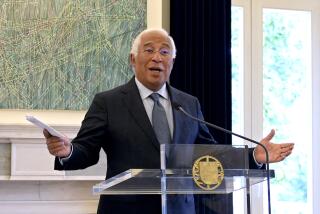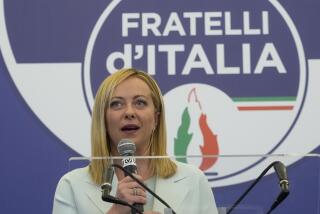Amid Scandal, Italy’s Premier Faces Chaos in Parliament
ROME — On Monday, the Ides of March, besieged Italian Prime Minister Giuliano Amato was smarter than Caesar: He did not go to the Senate. Instead, the former professor delivered a university lecture in London aptly titled “Italy and Europe: The Rules of Chaos.”
Back home Tuesday, Amato went to the Italian Parliament--and was greeted by chaos.
Bow-tied ushers averted physical violence among squabbling lawmakers, but the pandemonium mirrored the anguish of a nation whose confidence and institutions are being shredded by scandal.
The thorny question of political morality after a year in which more than 1,000 leading public figures and entrepreneurs have been implicated in illegal payoffs convulsed the fragmented Chamber of Deputies.
But even as opposition deputies were screaming “Thieves!” and brandishing a noose at Amato, judges in Milan and other major cities were making new cases against prominent business executives and politicians in a huge and growing kickback investigation.
Their most prominent target Tuesday was Renato Altissimo, leader of the small but influential Liberal Party, a junior partner in Amato’s sorely tried four-party coalition. He resigned after being notified he was under investigation for corruption and violating party funding.
“I never had anything to do with any tangenti ,” said Altissimo, the third party secretary to leave his post protesting innocence in the past few weeks. Tangenti is what Italians call kickbacks, payoffs and bribes.
Altissimo was one of 10 Parliament members formally notified Tuesday that they are under investigation. Others included Bettino Craxi, the former prime minister and former Socialist Party leader who faces about four dozen separate charges, and Antonio Cariglia, former leader of the Social Democratic Party, which, like the Liberals and Socialists, is a coalition partner with the dominant Christian Democrats.
The Milan magistrates directing Operation Clean Hands, as their anti-corruption crusade is known, also issued investigation and arrest orders for more officials, contractors and executives of the state’s electricity and highway authorities.
In the city of Rovigo, near Venice, a dozen business executives and officials were ordered to jail in a hospital scandal. In Naples, a scandal over garbage collection brought new judicial inquiries.
In Reggio Calabria farther south, a prominent Christian Democratic Parliament member and former minister, Riccardo Misasi, and nine others were accused of links to a kickback scheme in public works.
Amato went to Parliament on Tuesday to speak for the government in the final round of a moral debate conducted so far to a mostly empty chamber. But the opposition turned out in force. Neo-fascists, including Alessandra Mussolini, granddaughter of Italy’s former dictator, wore rubber gloves and waved sponges to cry “Whitewash!”--a reference to last week’s failed attempt by the Amato government to contain the crisis by decriminalizing illegal party financing through a decree.
Deputies from the right-wing populist Northern League waved a noose, and ushers had to fend off Socialists who charged them.
Eventually able to finish his remarks, Amato renewed his call for a political solution to the scandal and for sweeping political and institutional reforms.
“We need a deep renewal, not only of the rules, but also of the people,” said Amato, who has announced his own retirement when his mandate ends.
Amato’s government is desperately weak but remains in office because major parties do not want an election before a referendum on electoral reform April 18.
The reform would replace the current proportional system of elections with a direct majority voting for parliamentary candidates as in other Western democracies.
More to Read
Sign up for Essential California
The most important California stories and recommendations in your inbox every morning.
You may occasionally receive promotional content from the Los Angeles Times.










